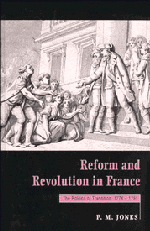Book contents
- Frontmatter
- Contents
- List of illustrations
- Preface
- Acknowledgements
- Introduction
- 1 Government
- 2 Society
- 3 Economy
- 4 Reformers and the reform constituency
- 5 Towards ‘a truly national representation’, 1787–1789
- 6 The National Assembly, 1789–1791
- 7 The political culture of revolution
- Conclusion
- Notes
- Bibliography
- Index
5 - Towards ‘a truly national representation’, 1787–1789
Published online by Cambridge University Press: 05 June 2012
- Frontmatter
- Contents
- List of illustrations
- Preface
- Acknowledgements
- Introduction
- 1 Government
- 2 Society
- 3 Economy
- 4 Reformers and the reform constituency
- 5 Towards ‘a truly national representation’, 1787–1789
- 6 The National Assembly, 1789–1791
- 7 The political culture of revolution
- Conclusion
- Notes
- Bibliography
- Index
Summary
The year 1787 saw the debate on the constitution of France begin in earnest. Accordingly, historians usually refer to the events taking place between the first meeting of the Notables and the summoning of the Estates General as the ‘Pre-Revolution’. Or else they label this period the ‘aristocratic revolt’. There are two objections to such a manner of thinking and they are worth stating at the outset. First, the labels determine the process of change in a way that none of the participants in the drama of reforming absolutism could possibly have comprehended. In a book whose objective is to explore the dynamics of transition from reform to revolution, it is important to resist the temptation to close off options. Second, neither term is satisfactory from a descriptive point of view. No doubt these years witnessed a resurgence of aristocratic political ambition, just as they witnessed a parlementaire resistance which displayed several of the characteristics of a revolt. But it is safer to keep these partners in the anti-ministerial alliance well marked. As the most recent student of the magistrates has observed, the Parisian and the provincial parlementaires were scarcely paladins of the aristocracy. Nor should we make the mistake of supposing that the resistance offered to ministers stemmed solely from sections of the elite. From the middle of 1788 ordinary town and country dwellers entered the debate, often to the dismay of nobles, magistrates and bourgeois professionals who preferred to concentrate upon a very different game of politics.
Representation – how to embody it both institutionally and socially – was the big issue exercising Frenchmen during these years.
- Type
- Chapter
- Information
- Reform and Revolution in FranceThe Politics of Transition, 1774–1791, pp. 139 - 174Publisher: Cambridge University PressPrint publication year: 1995



